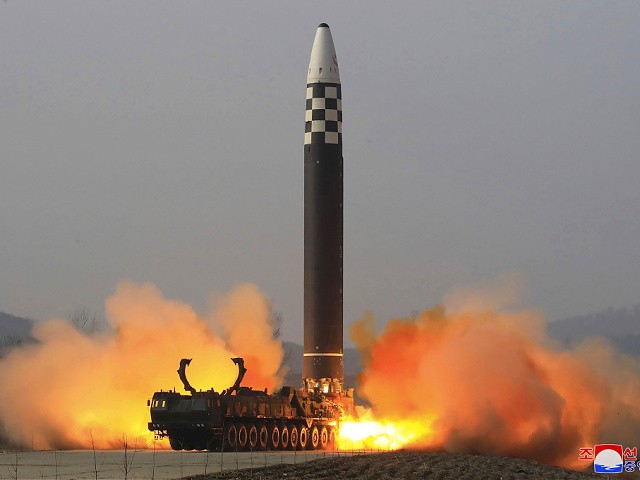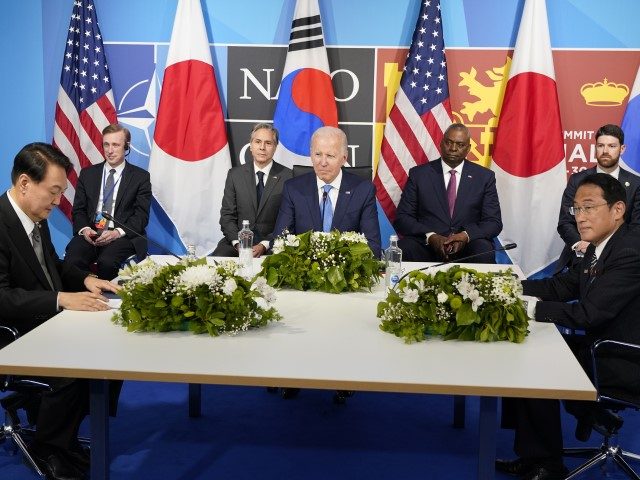President Joe Biden held a trilateral meeting with the leaders of Japan and South Korea – Prime Minister Kishida Fumio and President Yoon Suk-yeol, respectively – in Spain on Wednesday in which the two conservatives pressed Biden to prioritize the threat from communist North Korea.
The meeting, on the sidelines of the ongoing NATO summit in Europe, was a rare moment in which Biden was outnumbered as a leftist on the world stage. The public remarks by both Kishida and Yoon emphasized their mutual concern over rogue state neighbor North Korea and suggested anxiety about the fact that Biden has not implemented any meaningful North Korea policy since becoming president.
Kishida also appeared to signal concerns over potential military belligerence on the part of communist China, North Korea’s closest ally, remarking that the conferences in Europe this week should work to ensure that no country “draws the wrong lessons” from Russia’s escalation in February of its eight-year-old invasion of Ukraine – a comment the Chinese government interpreted as a warning for Beijing not to invade Taiwan.
North Korea, a communist dictatorship routinely identified as arguably the world’s most repressive, cut off all communication with the White House when Biden took office, did not address Biden’s visit to South Korea in May, and has since escalated its belligerence toward the United States, most recently attacking Washington for offering Pyongyang humanitarian aid.
South Korea’s nascent government under Yoon, taking over for leftist former President Moon Jae-in, has repeatedly warned since it took office in May that intelligence officials have found evidence that North Korea is planning a nuclear test. North Korea has not tested a nuclear weapon since 2017. Two-thirds of its nuclear tests occurred while Joe Biden was vice president.
In public remarks prior to the three leaders’ private meeting, Biden said the meeting was “an opportunity to further coordinate our trilateral efforts, specifically with regard to the Democratic People’s Republic of Korea [North Korea].”
“I look forward to additional dialogues in this format as we continue to strengthen our trilateral — our trilateral engagement,” the White House quoted Biden as saying, “and we remain deeply concerned at the DPRK’s continued escalatory ballistic missiles and tests and potential for — to conduct a nuclear test.”

This photo distributed by the North Korean government shows what it says is a test-fire of a Hwasong-17 intercontinental ballistic missile (ICBM) at an undisclosed location in North Korea on March 24, 2022. The content of this image cannot be independently verified. (Korean Central News Agency/Korea News Service via AP, File)
Kishida said he was “deeply concerned” about a potential North Korean nuclear test and other “further provocation,” calling for increased defense capabilities for all three countries.
“As confirmed on the occasion of President Biden’s visit to Japan and to the ROK [South Korea], the deterrence capabilities of the Japan-U.S. and U.S.-ROK alliances need to be upgraded as part of the essential effort to strengthen the trilateral partnership between Japan, the U.S., and ROK,” Kishida asserted.
Yoon, making his debut on the international stage after assuming the presidency in May, hinted vaguely at “increased uncertainties” in the “global landscape” that make cooperation among America, Japan, and South Korea especially crucial. He did not specifically name China as a source of that threat, instead option to address North Korea’s “nuclear and missile threats” as especially concerning.
South Korea and North Korea are technically still at war, although active hostilities in the Korean War ended in 1953. America and South Korea are allied against China and North Korea in the Korean War, meaning China and America also remain in a technical state of war with each other.
Similarly, Japan and Russia are technically at war with each other, as neither signed a peace deal after the culmination of World War II. Attempts to end World War II definitively have failed repeatedly due to a territorial dispute over the Kuril Islands, which Russia controls but Japan claims as its own.
Following the meeting, reportedly lasting about 25 minutes, South Korea’s government revealed the group “agreed to closely consult on ways to strengthen the U.S. commitment to extended deterrence in the region,” primarily but not exclusively addressing North Korea, according to South Korea’s JoongAng Ilbo.
Addressing the issue of China, an unnamed Yoon official said on Wednesday, referring to Yoon’s remarks to NATO member countries, “Although he did not specifically mention China, all speeches by NATO allies, including at the Korea-U.S.-Japan summit, stressed that China must play a responsible role and that all international relations should be conducted while respecting universal values and norms and agreements of the international community.”
Japan’s Kyodo News highlighted Kishida’s emphasis on upgrading “deterrence capabilities” – potentially signaling an expansion of Japan’s Self-Defense Forces – as a hardline departure from longtime Prime Minister Abe Shinzo, himself considered a hardline conservative for promoting amendments to the Japanese constitution that would allow the country to have a military. Abe never achieved the goal of amending the constitution, which remains highly controversial in modern Japan.
“Mr. Kishida is doing things that former Prime Minister Shinzo Abe would not have achieved, such as taking a hard-line stance on Russia and boosting defense spending,” Ken Jimbo, a professor at Keio University, told Kyodo News. “And he does not seem to be raising a sense of alarm among the public because he is known to be moderate.”
Kyodo noted that, domestically, Kishida’s right-wing Liberal Democratic Party is seeking to increase Japan’s defense spending to make it closer to what the average NATO country spends on its defense.
It also noted that Kishida did not directly attack China, but warned that the Ukraine assault could lead other countries to the “wrong lessons” about invading neighbors.
“Ukraine today may be Asia tomorrow,” Kyodo News quoted Kishida as saying.
China’s Global Times government propaganda outlet took notice of Kishida’s tone, condemning Japan and South Korea for allegedly “casting [a] shadow on Asian peace” by associating with free Western societies.
“China is closely paying attention to the three-way summit between US, Japan and South Korea on the sidelines of the summit, in which the Korean Peninsula issue will be discussed along with NATO’s Asia expansion against China,” the state newspaper reported.
“The Asianization of NATO is the US’ way to reintegrate its alliances in Asia, which used to be a ‘hub-and-spoke’ system centered on the US, but now it wants to strengthen intelligence and science and technology cooperation within allies,” a Chinese regime-approved “expert” told the Global Times.

COMMENTS
Please let us know if you're having issues with commenting.